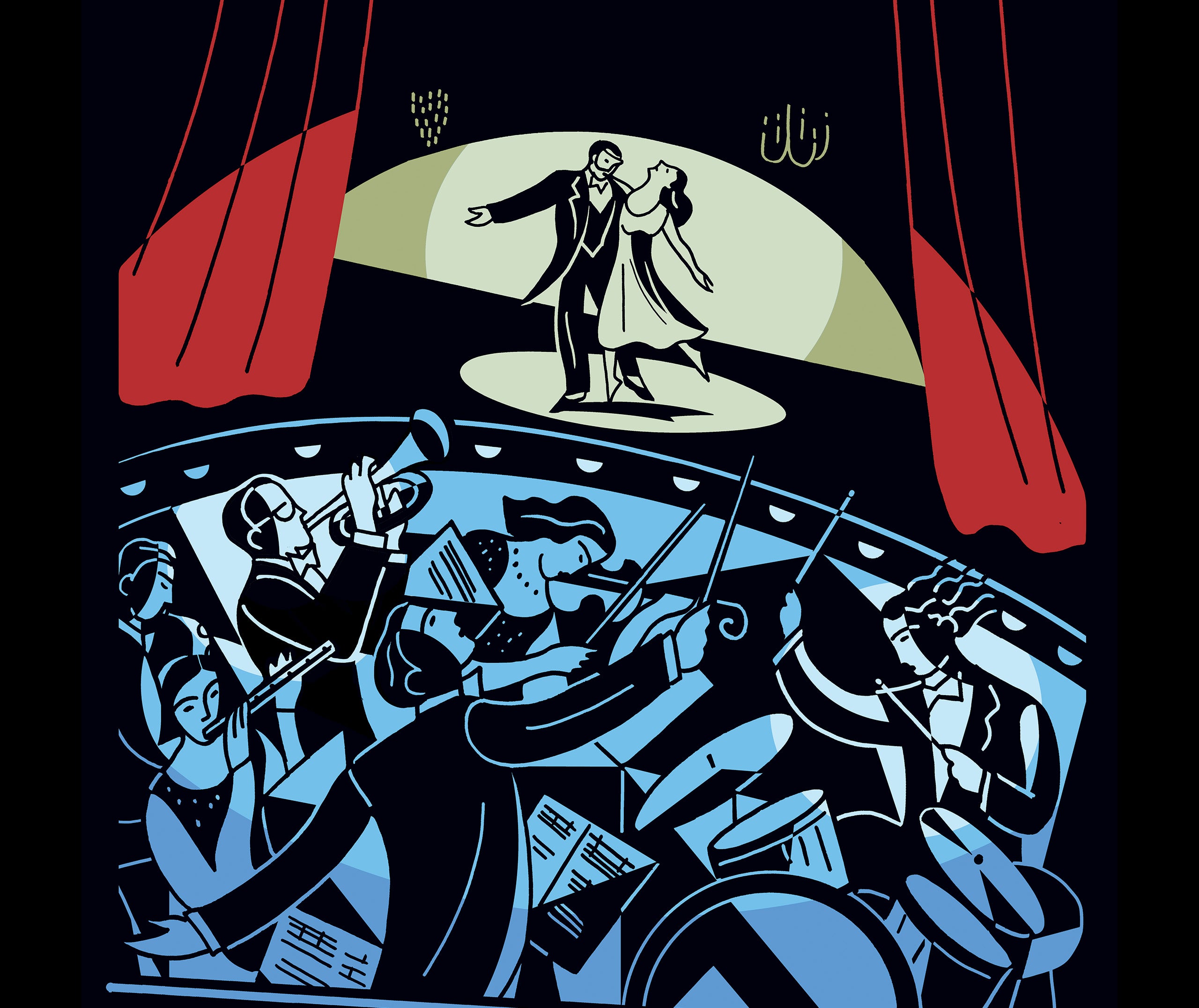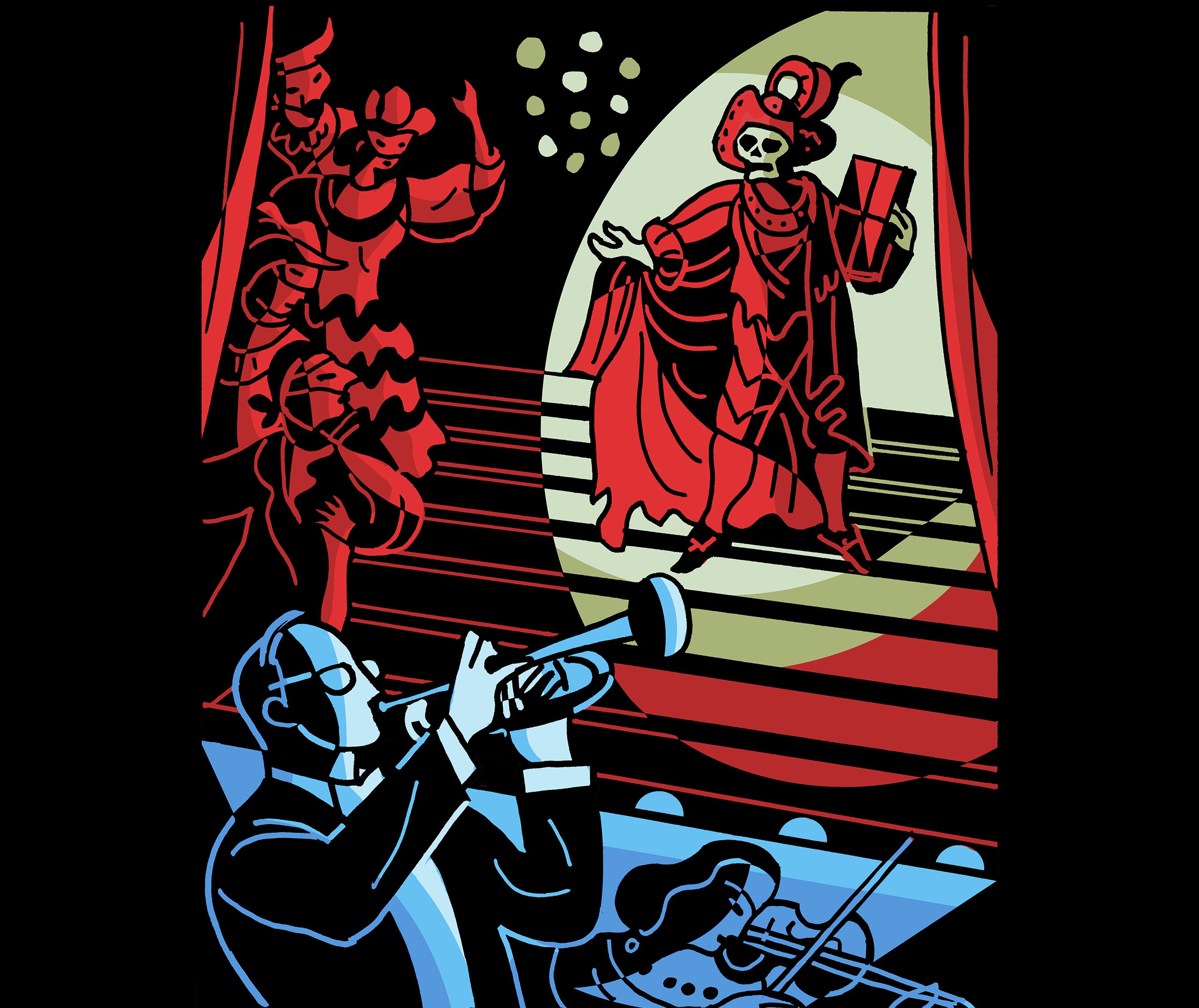The musicians of Broadway’s pit orchestras are seldom visible, but they are
essential to the productions that bring audiences to live shows. Nick Jemo ’06
and Jesse-Ray Leich ’17 have made careers in that unique space, delivering
music, energy, and artistry to help tell the stories we love.
By Anna Vaccaro Gray ’12, M.S. ’16
Illustrations by Anthony Russo ’74
Act II of The Phantom of the Opera—the longest-running Broadway production in history until its close in April—opens with the masquerade ball scene. The whole cast is on stage; the mood is jubilant, the lighting vibrant, and the costumes colorful. The characters are celebrating the presumed demise of the phantom, and their energy is explosive. When the phantom appears at the top of the stairs, crashing the party, the moment is jolting.
Essential to the scene is music—moving the plot forward, intensifying the experience, and communicating to the audience how the story is meant to feel. The music builds tension that erupts in triumphant glee, but then, when the phantom appears—terror. The orchestra creates an emotional climax, a trumpet bursts into a high C, and the mood changes starkly—without a word.
“It’s really fun,” says Nick Jemo ’06, who played trumpet for The Phantom of the Opera from 2009 until its close, of the pit orchestra’s contribution to this sequence. “It’s demanding to play, but it’s the only time in the show when the musicians can let loose.”
“Dialogue isn’t needed for the audience to experience the emotionality of the scene,” adds Jesse-Ray Leich ’17. “You feel it sonically through the music.”
So, while actors, dancers, and singers are in the spotlight, the people you don’t see—the musicians—make an equally big impact on a show’s resonance. Imagine that scene in The Phantom of the Opera with softer music, for example. It simply wouldn’t be the same rich experience.

“Dialogue isn’t needed for the audience to experience the emotionality of the scene. You feel it sonically through the music.”
–Jesse-Ray Leich ’17
Jemo and Leich are two of those artists you won’t see but will definitely notice. Graduates of URI’s music department with degrees in music performance and music education respectively, they are both working musicians in Broadway pit orchestras.
The Secret Life of Orchestra Pit Musicians
As freelance musicians, Jemo and Leich play a variety of roles, from guest appearances in philharmonics to playing with other artists. There’s nothing quite like Broadway, though.
They began like many other Broadway freelance musicians: Jemo by subbing and Leich as a member of a touring show. Jemo has played trumpet for Mary Poppins, The Phantom of the Opera, Les Misérables, Evita, Bad Cinderella, and Sweeney Todd. Leich has drummed for Mr. Saturday Night, KPOP, & Juliet, and the off-Broadway show Titanique. Regardless of the type of story, they say this kind of performance is singular. While much of what happens onstage is tightly choreographed, the musicians’ world is different.
Nick Jemo ’06 (left) and Jesse-Ray Leich ’17.
Playing in a theater pit is unique because musicians are usually not visible to the audience. Depending on where the orchestra is located, what the conductor allows, and how often one’s instrument is featured, musicians find creative ways to pass the time between active playing during a show. Some do crossword puzzles or computer work, some play iPad air hockey, and some play pranks on each other. Leich says of playing for Mr. Saturday Night, “It was a musical comedy so there were laughs on stage, and plenty behind the scenes, as well.”
While working full time for The Phantom of the Opera, Jemo read about 20 books a year during live performances. “When you play the show hundreds or thousands of times, you can get completely lost in a book,” he says. “The second your brain hears your cue to come in, you just know. If it’s a really good book or I’m in the middle of an intense paragraph, I can pick up my book during just 10 measures of rest and know exactly when to jump back in. It’s muscle memory.”

“You need to know your show well enough that when things happen, you can make smart decisions about how to recover and continue the show.”
–Jesse-Ray Leich ’17
There are also unexpected situations that arise during live performances. Leich has had his in-ear monitors cut out, cracked a snare drumhead, and seen a bat fly across the stage. Right before one of Jemo’s big solos during Mary Poppins, the mouthpiece for his horn went flying just as he was raising it. Miraculously, it landed within reach, so he grabbed it, fixed the instrument, and completed the solo.
“You need to know your show well enough that when things happen, you can make smart decisions about how to recover and continue the show,” Leich says.
“When things go wrong, those can be the most entertaining moments,” Jemo adds. “They make things interesting. We play the same songs day after day, so those moments add levity.”
Since Broadway pit musicians play the same music night after night, personnel changes can provide a welcome disruption. When a musician has a full-time contract with a pit orchestra, they are allowed to take up to half of the shows off, and they get to choose a lineup of five subs.
Because of this, it’s unusual to find an all-regular pit orchestra. While an office job with an ever-changing group of coworkers might prove challenging, in an orchestra pit it fuels a sense of creating something fresh each night. Each sub brings their own style and expertise; no two will ever play the same music identically. Jemo calls this the flavor each individual musician brings; Leich calls it the authenticity.
From URI to Broadway
While they never crossed paths as students, Jemo and Leich recognize aspects of their musicality and professionalism that were instilled in them at URI, and they are remembered for having similar gumption. “They were both people who grew tremendously because they took advantage of every opportunity they could,” Mark Conley, chair of the music department, says of them. “We saw them grow exponentially as a result.”
Conley notes that URI’s music department fosters well-rounded experience and training. The relatively small size allows meaningful connections between faculty and students to flourish, and students are offered a variety of ways to exercise different artistic muscles.
For example, Jemo became enthusiastic about the piano during his first year, and although he never planned to pursue it professionally, Professor Manabu Takasawa saw his enthusiasm and began weekly piano lessons. “We can afford to get to know each individual and teach on a one-on-one basis,” Takasawa says. “When you meet a student like Nick, it’s incredibly rewarding.” Jemo played a Chopin piano piece for his senior trumpet recital encore and Takasawa was his accompanist. “I got to do a lot of things I wouldn’t have otherwise if I hadn’t been nurtured like that,” Jemo says. “It was really special for me.”
When Leich became interested in a career on Broadway, he learned that a beloved professor, Susan Thomas, sometimes played in pit orchestras for touring productions at the Providence Performing Arts Center. His interest was piqued. Thomas did not have personal connections on Broadway but introduced Leich to another URI professor who did, Ted Mook. “It was awesome to hear his personal stories,” Leich says. “It was very generous of him to offer up his time, especially because I had never had him as a teacher.”
These experiences provided important lessons about working on Broadway, where everyone in the pit orchestra is a skilled musician and one’s ability to get a gig often depends on being the type of person people want to call. “Part of musicianship is an ability to relate to other musicians and learn from them. If you’re open to people and can speak their musical languages, you’re going to be more successful,” Conley says. “One of the reasons they both have these careers is because they can do exactly that.”
The Economic Story of Broadway
After an 18-month closure during the pandemic, Broadway shows reopened in September 2021. The industry still faces fallout, including lower ticket sales. Many shows are, at best, not recouping costs, and, at worst, closing their doors—even the ones that once seemed untouchable. The Phantom of the Opera ended its record-breaking 35-year run in April after more than 13,000 performances.
As part of cost-cutting, some producers are flirting with the boundaries of what constitutes music, introducing the most significant threat to pit musicians: pre-recorded tracks in place of live musicians. A pre-recorded track only requires paying musicians once, after all.

“Prerecorded tracks completely dismiss musicians as if they’re not part of live theater. It might cut costs. But at what cost?”
–Nick Jemo ’06
While contractual protections remain for musicians, there are ethical and artistic concerns. “You go to live theater for everything to be happening in that moment—that’s the point,” Jemo says. “Prerecorded tracks completely dismiss musicians as if they’re not part of live theater. It might cut costs. But at what cost?”
As both an art form and an industry, Broadway’s grapple with this tension is complex. “It’s definitely a new age in musical theater,” Leich says. “Many pop shows are happening now, and some are seeing great success.” Leich is currently drumming for & Juliet, which presents a score of early 2000s pop hits from the likes of Britney Spears to Katy Perry, presented by Max Martin. “That production has done an amazing job of orchestrating the hit songs with a full live band in mind,” he says. “The big energy the band puts out is one reason the show is so successful.”
Not all pop shows have been as eagerly embraced, though. Leich also drummed for KPOP, which made history as the first Broadway musical centered on Korean pop culture, with songs from Helen Park, Broadway’s first female Asian composer. It tried to combine both live musicians and prerecorded tracks, and Leich was one of a three-person orchestra. “There weren’t enough musicians to output the energy you need for a live musical theater production, and, unfortunately, I think that is one of the big reasons it did not succeed,” Leich says. The show ended after 44 preview performances and 17 regular performances.
Artistry and Shared Experience
The growing prominence—and skill—of artificial intelligence presents new concerns. While pit orchestras have not yet incorporated symphonic AI to replace human musicians, there are foreshadows of this technology: keyboards that can sound like any instrument and can be used to achieve a fuller sound. Their potential use is not necessarily wholly destructive, but it makes many musicians wary. “Getting rid of minimum requirements for the number of musicians in orchestra pits and using more keyboard players feel like the biggest threats to musicians,” Jemo says.
Electronic accompaniment might have a place in certain scores, but the possibility of a wider shift begs consideration about the role of music in a musical production: Should it be simply a sonically precise backdrop for the artists on stage? Or is it most resonant when it showcases the artistry of the musicians as an irreplaceable element in the experience of the show?

“It’s hard to explain the energy shift from when we’re rehearsing to when the audience shows up and we can share the experience. It’s just so human.”
–Nick Jemo ’06
The tensions of this cultural moment illuminate a consistent truth: The stories we rely on for entertainment—whether streamed at home or experienced live—rely on humans to write, edit, act, play, compose, and perform them. This essential creativity can never be rendered irrelevant because it’s fundamental to why we’re drawn to these stories in the first place: to connect with other people as we process and enrich our shared humanity.
“That’s what it’s about,” Jemo says. “Sharing your art with other people. It’s hard to explain the energy shift from when we’re rehearsing to when the audience shows up and we can share the experience. When we’re all sharing that energy, it’s just so human. We can be transported, absorbing what we are creating together in the moment.”
Whether or not we see the musicians, they help us make sense of the story. Their contribution provides the emotional impact that orients us within the highs and lows of plot twists, climaxes, and resolutions. A story without this emotionality is limited; a show without the artistry of live musicians is cheapened. They give us something essential to understanding. As Jemo says: “What words can’t say, music can deliver.”
Illustrations: Anthony Russo ’74
Photos: Nick Jemo ’06, Jesse-Ray Leich ’17
The Kingston Chamber Music Festival Connection
Besides the fact that they’re both Broadway pit musicians, Nick Jemo ’06 and Jesse-Ray Leich ’17 have something else in common: They both earned scholarships from the Kingston Chamber Music Festival (KCMF) as URI undergraduates. Jemo was the first-ever KCMF scholarship recipient in 2004; Leich was a 2016 recipient.
Established in 1989 by David Kim, concertmaster of the Philadelphia Orchestra since 1999, with the support of URI administrators, KCMF was the manifestation of Kim’s vision to bring world-renowned musicians to Southern Rhode Island for chamber music concerts at affordable prices. The festival hosts a two-week series of concerts on URI’s Kingston Campus every summer.
Supporting rising young artists is integral to KCMF’s mission. The scholarship was established to bolster the relationship between the festival and URI. One music student at the sophomore level is selected by URI music faculty each year; a total of 21 students have received the award since its inception. “I am extremely grateful for organizations such as KCMF because they help shape musicians who truly want to pursue music as a career,” Leich says.
Learn more at kingstonchambermusic.org.

Jesse-Ray so proud of your accomplishments. I know your mom is so proud too!! Happy you are now on Broadway. Will look for you when I get to see &Juliet (it is on my list).
All the best to you
Your former school nurse
Mrs. Linda Twardowski